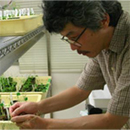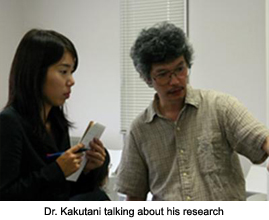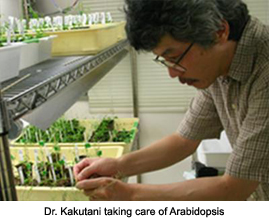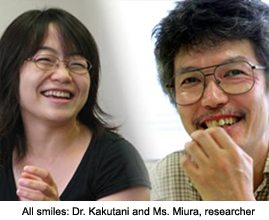KAKUTANI, Tetsuji D. Sc., Professor

- Division of Agricultural Genetics, Kakutani Group
Exploring next-generation botanical genetics
Prof. Tetsuji KAKUTANI stood up slowly and brought back from the hallway a poster introducing his research. On the poster was a photo of a model plant, Arabidopsis. He then started talking about his research.
- Expanding research area
 “I’m quite happy that I can use power of genetics in this plant” he said. Dr. Kakutani and his team are using mutants of Arabidopsis to understand mechanisms of ‘epigenetic’ phenomena. “Phenotypic variations can be generated not only by changes in nucleotide sequences but also by modifications of gene activity, which can be heritable over cell divisions. Molecular bases for such epigenetic phenomena are chemical modifications of chromatin proteins and DNA itself. We are studying their control and function” explains Dr. Kakutani. He takes genetic approaches for solving the mystery, through a number of genetic crosses and analyses. “I don’t want to compete in time for obtaining results that others can obtain. One can do interesting research by looking into phenomena where nobody has realized.” Accordingly, he concentrates more on characterizing his research materials than starting new experiments under the influence of publications by others.
“I’m quite happy that I can use power of genetics in this plant” he said. Dr. Kakutani and his team are using mutants of Arabidopsis to understand mechanisms of ‘epigenetic’ phenomena. “Phenotypic variations can be generated not only by changes in nucleotide sequences but also by modifications of gene activity, which can be heritable over cell divisions. Molecular bases for such epigenetic phenomena are chemical modifications of chromatin proteins and DNA itself. We are studying their control and function” explains Dr. Kakutani. He takes genetic approaches for solving the mystery, through a number of genetic crosses and analyses. “I don’t want to compete in time for obtaining results that others can obtain. One can do interesting research by looking into phenomena where nobody has realized.” Accordingly, he concentrates more on characterizing his research materials than starting new experiments under the influence of publications by others.- Experiments are more fun when results are totally unknown
 Dr. Kakutani studied morphogenesis using a cellular slime mold Dictyostelium while he was a PhD student. Later, he became interested in genetics and started research using Arabidopsis. He claims to have created a “world known to me alone” by consistently moving forward dictated by what intrigues him. “I want to do experiments whose results are as unknown as possible.” Dr. Kakutani speaks calmly but firmly. He is naturally happy when his hypothesis is verified, but there are other happy moments in research. “I get excited and feel truly rewarded when I obtain unexpected but really convincing results.”
Dr. Kakutani studied morphogenesis using a cellular slime mold Dictyostelium while he was a PhD student. Later, he became interested in genetics and started research using Arabidopsis. He claims to have created a “world known to me alone” by consistently moving forward dictated by what intrigues him. “I want to do experiments whose results are as unknown as possible.” Dr. Kakutani speaks calmly but firmly. He is naturally happy when his hypothesis is verified, but there are other happy moments in research. “I get excited and feel truly rewarded when I obtain unexpected but really convincing results.”- Slowly seeding for the future
 Arabidopsis, a model plant with a relatively short life, is ideal for genetics, but one generation of this plant, necessary to obtain seeds, is longer than one month.
Dr. Kakutani uses this time to plant seeds for the other experiments. “Since you can’t immediately act out your ideas in experiments, I want to be ready for my next moves by preparing materials.” He said, “Arabidopsis seeding and crossing, that’s my job”.
Arabidopsis, a model plant with a relatively short life, is ideal for genetics, but one generation of this plant, necessary to obtain seeds, is longer than one month.
Dr. Kakutani uses this time to plant seeds for the other experiments. “Since you can’t immediately act out your ideas in experiments, I want to be ready for my next moves by preparing materials.” He said, “Arabidopsis seeding and crossing, that’s my job”.- (Interviewed by Leave a nest Co.,Ltd in 2006)
















